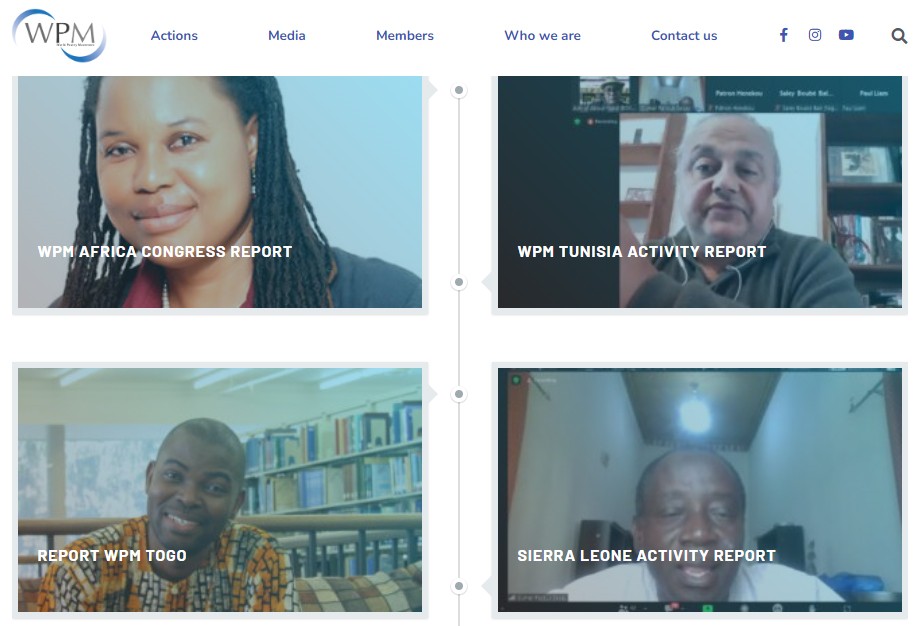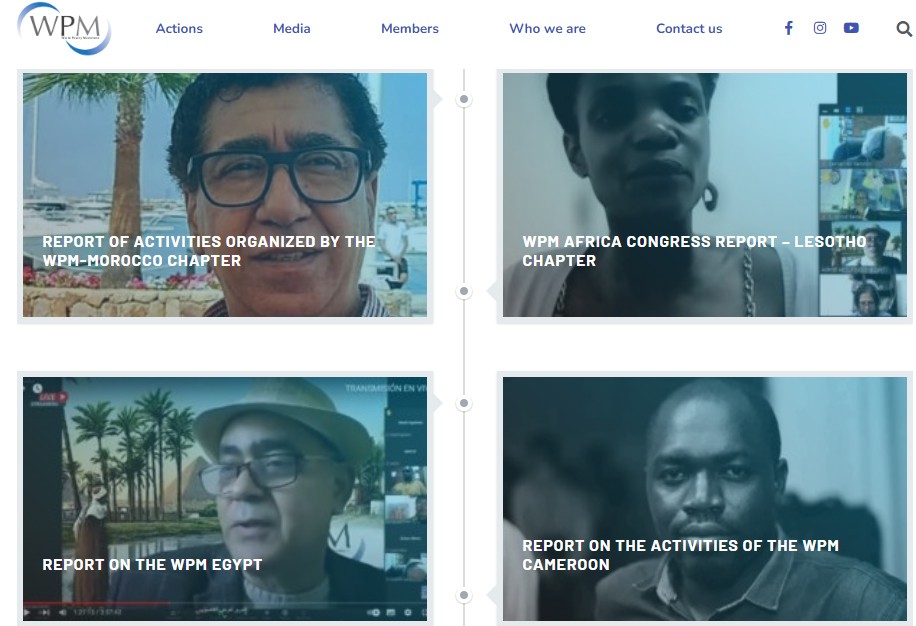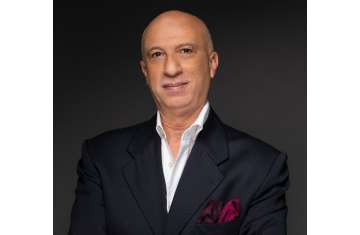In the crucial search for the unity of the poetic forces of Africa, and to make much more visible the immense contribution of the poetry of that continent to the world, the Virtual Congress of the World Poetry Movement (WPM) Africa was held on January 21-22, 2023.
About 50 poets attended the 2 days congress, of them there were more than 25 national coordinators representing that number of countries of the continent, and number of international poets and observers’ participants.

The World Poetry Movement is a coordination of international poetry festivals, poetry projects and poets from 150 countries that, through the globalization and realization of poetic actions, seeks to contribute to the construction of a new humanism for the twenty-first century, permanently promoting intercultural dialogue through the fraternal and universal language of poetry, a path to the transformation and renewal of consciousness, for the benefit of a humanity at peace, reconciled with nature and aware of both cultural diversity and the sense of justice and social inclusion in the processes of cultural development of all the inhabitants of the planet.
The coordinating Committee WPM AFRICA had Ayo Ayoola-Amale, (Ghana), Ashraf Aboul-Yazid (Egypt), Zolani Mikiva (South Africa), Siphiwe Nzima (Lesotho), Vera Duarte Pina (Cape Verde), Recaredo Silebo Boturu (Guinea Ecuatoria), Nimrod Bena (Tchad), Ismaël Diadié Haïdara (Mali) and Khalid Raissouni (Morocco).
15 African poetry ambassadors
The election of African 15 representatives at the 1st WPM Congress - Medellin / Caracas next summer gave the list of 15 African poetry ambassadors, to represent the continent. The full list has been announced as following: Ayo Ayoola-Amale, (Ghana), Ashraf Aboul-Yazid (Egypt), Zolani Miki (South Africa), Siphiwe Nzima, Lesotho), Vera Duarte Pina (Cape Verde), Nimrod Bena (Tchad), Ismaël Diadié Haïdara (Mali), Khalid Raissouni (Marruecos), Saley Boubé Bali (Níger), Omar Farouk Sesay (Sierra Leone), Achour Fenni (Argelia), Etanat Awol (Ethiopia), Paul Liam (Nigeria), Recaredo Silebo Boturu (Equatorial Guinea) and Tarek Eltayeb (Sudan).
The congress days were organized by the World Poetry Movement, the International Poetry Festival of Medellin, the Ministry of Foreign Affairs and the Ministry of Communications and Information of Venezuela.
A Message from the Continent

Dr. Ayi Ayoola-Amaleو, Continental Coordinator of the World Poetry Movement in Ghana said that The 1st WPM Africa preparatory congress towards our WPM Global is indeed a very laudable initiative. WPM Africa has grown over the years from few Africa poets to poets spread across the length and breadth of the African continent. To date we have at least coordinators in 24 countries and growing. These 24 WPM national coordinators in Africa are expected to participate in our first Congress themed “Migration from death to life.”
The theme speaks to the global crisis where we find ourselves living in a time where the fundamental underpinnings of democracy are being challenged even the 1948 Universal Declaration of Human Rights, the 1951 Geneva Convention on refugees, are being called into question. The most unmistakable facts, such as climate change, are declared fake news, while in actual fact, fake news reports are infiltrating and influencing accepted mainstream news media. WPM poets like all concerned citizens of the world are not just concerned about nationalistic currents and the fact that humanity is being shaped by the dismantling of civil society in many parts of the world, the criminalization of vocal poets, peace and human rights activists, dissidents, oppositionists, gays and lesbians, we carry our programs to call these evils out.
The state of peace we have grown accustomed to in some part of the world can no longer be taken for granted. Indeed, Africa bears the bulk of this crisis. It explains the very important role poets in Africa have to play. On her Ghana WPM Report she wrote: “ For 2023 Agenda– our main agenda is to continue our niche programs, our monthly poetry reading sessions and to continuously bring poetry to the classrooms. To grow our poetry clubs in schools not just in numbers but to actually ensure poetry is brought to life. Hopefully to start a poetry journal. On partnership she explained: “Our key partner, collaborator and sponsor has been Splendors o Dawn Poetry Foundation. We a great working group of committed poets. We also have collaborations with schools, ministry of education, other poetry groups, organisations and poets in Ghana. We work together to ensure that poetry take root in human hearts through growth, advancement and success of the movement, the chapter and ultimately poets and poetry within the region.”
From Tunisia to Togo
Moëz Majed ,Tunisia gave a full WPM Tunisia activity in 2021 and 2022, including screening of the documentary film “Red Poet” which traces the journey of Jack Hirschman.
The National Coordinator Dr Patron Henekou, Togo, said that the activities of the World Poetry Movement – Togo started on February 23, 2019 by organizing an evening of reading and declamation of poems around the theme “For a world without walls”. More than twenty poets had taken part in this event with more than fifty texts declaimed before an audience of more than two hundred people. He also mentioned that “the contacts made within WPM-Africa have facilitated the invitation by the organizing committee that I chaired, the very active and talented Egyptian poet Ashraf Dali to the first ever International Literary Symposium of Togo (SYLITO) held on 22 and 23 April 2022 at the University of Lome. It should be noted that the SYLITO was organized by the Togo Writers Association (TEA) with the collaboration of the Pan African Writers Association (PAWA). He invited WPM-Africa to be more open and patient. We have an invaluable wealth of diversity of languages and cultures, and a poetic field that is reaching out to us for a most exciting adventure of beauty and accuracy.

Oumar Farouk Sesay, Coordinator of the World Poetry Movement in Sierra Leone, said: “Project undertaken on March 21st, 2019 World Poetry Movement, in partnership with the African Poetry Society -Sierra Leone, organized its first World Poetry Day at Africell American Corner with young and veteran poets in Sierra Leone. The program was focused on celebrating past and currently established writers in the country. Also, an Inter-Secondary School Poetry Competition was staged among ten schools within Freetown. This project was implemented to create a sustainable poetry platform for young Sierra Leonean poets to enhance the magnificence of the oral tradition, which is one of the key aims of the United Nations Educational, Scientific, and Cultural Organization (UNESCO). The program was entirely sponsored by the membership of the two organizations earlier stated. Nonetheless, we received twenty competitors for the Inter-Secondary Schools poetry Competition, one hundred and five attendees, including three seasoned and experienced veteran writers who served as judges for the competition. The Prince Of Wales Secondary School Kingtom (POW) emerged as the first winner, and Grammar School clinched the 1st Runner Up position.”
Mali: A Language Dies, a Poetic Form Disappear
Ismaël Diadié Haïdara, Coordinator of the World Poetry Movement in Mali, said that in addition to promoting poetic creation and its dissemination, World Poetry Movement – Mali aims to safeguard poetic genres in the non-Western world. Indeed, of the 7000 known languages, 3000 are at risk of extinction. With each language that dies, poetic forms of living and expressing the world disappear. The Tower of Babel is no longer a myth, it is our tragic reality. All the poets of the world, whatever their language, write in the same forms and with the same metaphors generated by the Western tradition. The West has given us Sappho and Pindar, Horace, Virgil and so many poets of its history. To that poetic heritage let us add our poetic genres, our feeling and our thinking. If this is not the case, if WPM does not rescue the other poetries of the world, we will witness a planetary memoricide. To decolonize poetry without losing the fabulous poetic heritage of the West is to give voice to the poetic diversity of the world. It is a need shown by Nobel Laureate Le Clezio speaking of the poetry of the Ibo of Nigeria, introducing the works of Lautreamont, and by another Nobel Laureate, Elias Canetti speaking of the Bushmen. World Poetry Movement will fulfill its global mission by saving so many poetic genres that are dying with the languages that sustain them.
Thanks from Niger
The National Coordinator of Niger, Dr Saley Boube Bali said, “The WPM-NIGER Chapter really started its activities on October 2, 2021 with a tribute to the poet Jack Hirschman.
He identified these findings; “1- The lack of support for literary creation, particularly poetry. 2- Insufficient exchanges between Nigerien poets and those from other regions of the world. 3- The need for the creation of a federative structure of Nigerien poets. 4- The implication of this structure for a better sharing of the fundamental questions which the involvement of this structure for a better sharing of the fundamental questions which touch the existing and the future of our common humanity in order to carry the voice of the poets. That is why the Nigerien poets thank the World Coordinator Fernando Rendon for choice of our country for the creation of a national coordination WPM/NIGER, as well as Mr. Francis Combes, WPM-FRANCE, for his support.”
Namibia’s Narration
National Coordinator of Namibia, Keamogetsi Joseph Molapong said “Through the initiatives and activities of Township Productions, poetry in Namibia has seen some major activities taking place during 2022. Most of the activities were collaborations and poets, organizations and some institutions that have for long associated themselves with the work carried out by Township Productions. As part of its annual programming, Township Productions made a call to poets in Namibia to submit their poems for consideration and inclusion in the 3rd Poetry collection of poetry called ‘A Conversation: the Africa in ME’ However, due to a broader interest in the theme, poets from other Southern African Countries requested submission and as a result, poets from 11 countries submitted their works. Two other poetry publications were published online during 2022. ‘The Heartbeat of Pain’ by Keamogetsi joseph Molapong and ‘A voice from my Thoughts’ by a young brilliant poet Haggai Poetry Project 2022. ‘Like a whisper in the Wind’ was another another poetry collection launched in 2022. This is a bi-lingual (English with German translation) literary expedition by Namibian Poets.
From Morocco, in Spanish
National Coordinator Morocco, Mohamed Hajji Mohamed had a paper read in Spanish by Gloria Chvatal, WPM organizing committee: “The world poetry movement in Morocco organized in partnership with the Forum for Thought, Culture and Creativity, two poetry activities in response to the call of the WPM. The first poetic activity was organized under the slogan “Back to the People” in December 2018 and the second activity was organized under the slogan “For a world without walls” on Thursday, February 28, 2019. In response to the call by the International Coordinating Committee of the World Poetic Movement to pay tribute to Jack Hirschman, the WPM-Morocco organized, in partnership with the House of the Press of Tangier and the publishing house Virgule Éditions, a memorial day in memory of the American poet; one of the founders of the movement and one of the most prominent voices of contemporary world poetry against racism and colonialism. The ceremony took place on Friday, October 22, 2021, at the headquarters of the House of Press in Tangier, in the presence of several artists, intellectuals and poetry lovers.
Egypt: A TV Channel for World Poetry Movement
The National Coordinator of Egypt, Ashraf Aboul-Yazid, said in Africa, millions are suffering a lot. Their lives have trampled over them with so critical problems. They are threatened by poverty, crushed by unemployment, wars, and disease overcomes them. The statistics tell us a lot about the aggravation of humanity’s problems in the twenty-first century, as if the more humanity progresses, the more it crushes the human beings on the way to progress.
Today, citizens are no longer victims of authoritarian regimes alone; the monsters of the pandemics, high prices and corruption have drawn in on them, to the extent that well-being is no longer on their list of ambitions, but rather is satisfied with meeting their basic needs. Safety has become a basic requirement, which they seek, safety at home, street, school and workplace, safety for them and their families, safety for them and their communities.
The question we – the African poets – must answer is: What will we do?
He said: “The WPM TV Project was a proposal submitted by Ashraf Aboul-Yazid, Egypt, “I believe that this is the right time to launch the first TV channel devoted totally for poetry and poets. It is time to call world poets via this congress and the following editions of congress in other continents to start building the content of this unique TV channel. Readings of poems, documentaries of poets, poetry festival sessions, poetic interviews, visiting poetry houses and museums, promoting volumes of world poetry, and other topics related to poetry. This content to be arranged and created in a schedule to have a table known for all world poets. A TV channel to be broadcasted 24/7 to spread the values we believe in, to assist the principals we fight for, in native and world languages we speak. The first result of holding the WPM Congress - Africa is experiencing the perfect capabilities the technical authorities in Venezuela have, and the long experience the organizing committee of WPM has. Together they can establish this poetry miracle .”
Cameroon: Poetry for all
National Coordinator of Cameroon Mpesse Géraldin, said : “As coordinator of the World Poetic Movement in Cameroon, I worked during this period with literary associations in order to create a bridge between the poets of my generation and our predecessors. This allowed me to meet with Cameroonian poets, artists and writers to share with them the objectives and vision of the movement. I organized poetic actions, both face-to-face and virtual, with the aim of making poetry a common language in a society whose cohesion tends to fragment. Speaking of poetic actions, on August 26, 2018, I organized a poetic action under the theme “For a world without walls” with the poets Grimo, Gils Da Douanla, Djimeli Raoul, Charly Wassing, Njipendi at the house of culture at FIAA in the Nsimeyong district in Yaoundé. It was a recital followed by an exchange that plunged us into a debate on migration, given the condition of black immigrants around the world…” “On March 17, 2022, as part of the African Festival of Emerging Writers (FESTAE) of which I am one of the organizers, I conducted a poetry workshop at the Department of Spanish at the University of Yaoundé 1, which allowed me to detect young students interested in poetry. At the end of this fruitful and enriching meeting, we created a forum for exchange and sharing on poetry called “Poetry for all”.
Algeria: Social media to publicize poetry movements
Dr. Achour Fenni, Ntional Coordinator of the World Poetry Movement in Algeria, said: “Among the active organizations that contributed to strengthening the poetic movement in Algeria: The Algerian House of Poetry, which supported the movement organizationally and during events.Among the most important activities that we carried out in cooperation with the Algerian House of Poetry: For a world without walls, where it was announced and activities were implemented in more than 26 cities. In the field of meetings with actors, participation in meetings and cultural dialogues, including a meeting, about the impact of the Algerian revolution on the world literature through intellectual currents in support of liberation movements in the world and the emergence of post-colonial studies and subaltern studies. Also among the activities is research into local poetic forms and practices across different regions of the national territory. In this context, many popular poetic forms and poetic practices were identified within distinct local cultural contexts.
In his recommendations, he wrote: “With regard to the World Poetry Movement, we support the movement’s efforts by using social media to publicize poetry movements at a global level. We suggest that it be intensified for more participations, and at the same time we call for studying the possibility of printing books to introduce distinguished poetic movements around the world. With regard to the global poetry movement in Africa, we call for special and popular poetic forms to be taken care of, recorded, documented and published to make them known. We also call for studying poetic practices within their cultural and social contexts, taking care of actors and supporting them socially and humanly. Social transformations have made cultural practitioners in general, especially poets, lead a difficult life. On the other hand, we call for taking care of the local languages, which involve great creativity, but did not receive much attention from the media and researchers.”

Comments